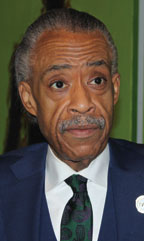
Sharpton talks about the struggle today
By LaGloria Wheatfall Houston Defender
HOUSTON, TX – Al Sharpton said the assault on voting rights continues to be one of the biggest challenges facing African-Americans today.
Sharpton made the comments during a trip to Houston, where he was guest speaker at Houston Community College’s Black History Gala. Speaking with reporters before the event, Sharpton said the National Action Network – which he founded – is at the forefront of the fight for rights.
In addition to serving as president of NAN, Sharpton is host of a daily television show on MSNBC and hosts a nationally syndicated radio show “Keepin’ it Real.”
Sharpton prides himself on taking the side of “rejected people,” and is vocal on topics ranging from gay rights to racist stereotypes to gun control. Here, he discusses civil rights, poverty, education and his mentor, the late James Brown.
Q. What are the biggest challenges facing the civil rights struggle today? What are you doing to address them?
A. Well, I think the biggest challenges are voting rights. We have seen an erosion of our ability to vote without impediments, [such as] changing the voting laws of voter ID, cutting down early voting and stopping same day voting. The leader of the pack has been this state [Texas]. I think the criminal justice system is very challenging. Look at what just happened with the Michael Dunn case in Florida. We are on that. I will lead the rally out there on the 10th of March.
With voter rights, the National Action Network has been at the forefront of fighting these state laws, as well as stand-your-ground laws…The problem I think that many have is that you can’t fight the 1960s battles now. You have to fight today’s battles. And today’s battles are to make sure that we do not have laws changed state by state and we fight for public opinion not to be swayed with misinformation.
Q. This year is the 50th anniversary of President Lyndon B. Johnson’s war on poverty. Why are African-Americans still struggling? Will we ever achieve income equality?
A. The shortest war in history was the war on poverty. Johnson announced it in 1964. By 1966 there was a war in Vietnam, which took all the money out and they never went back. So we never fought the war on poverty, we never finished it. Dr. Martin Luther King was on his way to Washington to push for this campaign, then later was killed. So I think a lot of times when we talk about the 50th anniversary, we act like we’ve being doing this 50 years. We didn’t…
I think we will achieve income equality. You know as hard as things seem and as much as we have to fight, I’ve seen so many things change in my lifetime that I know we can win. I think about the fact that I stood in the square in Johannesburg in 1994 and watched them proclaim Nelson Mandela as the president. Nobody ever thought that would happen. I also sat on the platform, two rows from Barack Obama putting his hand on the Bible and becoming the president of the United States. So I’m a firm believer in what appears to be impossible can happen if we keep going.
Q. The Houston Independent School District is considering closing five schools in minority areas due to low enrollment. How can we get the community more involved so that this doesn’t happen?
A. One, you’ve got to increase enrollment. Two, you have to mobilize every aspect of your community. They’ve been closing schools in Chicago and the way our chapter there dealt with it was really getting parental involvement, involving churches, community organizations and dealing with it as a crisis. We cannot just watch things go by like it’s the news about somebody else. These are our kids, so I think you’ve got to involve everybody on a crisis basis.
Q. You once said James Brown taught you how to be a man. What do you mean by that?
A. When I was a teen, James Brown’s son and I were close. His son was killed in a car accident, so James Brown kind of took me as the son he lost. My father left when I was 9 and I started in civil rights when I was about 12 or 13, but I’ve never had a father-son relationship with anybody. I’ve had mentors, I’ve had teachers, but James Brown actually would let me stay with him, would advise me on things that men would advise their sons on. So though I was never in show business and he never was in
